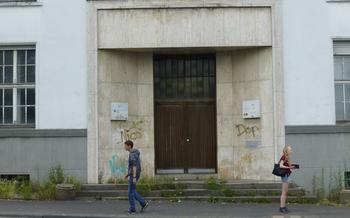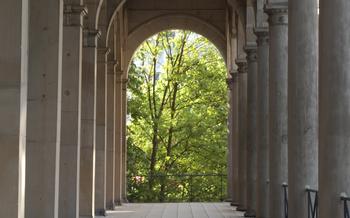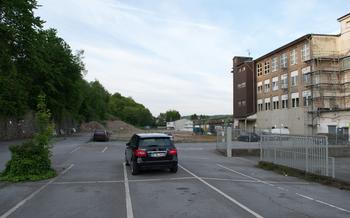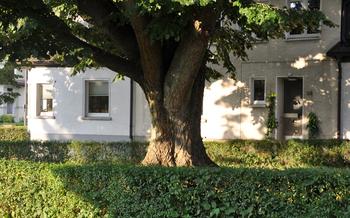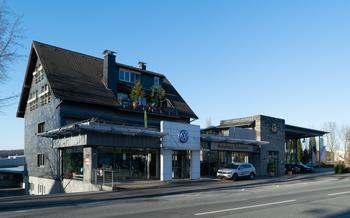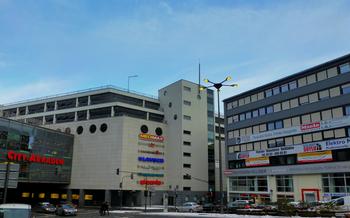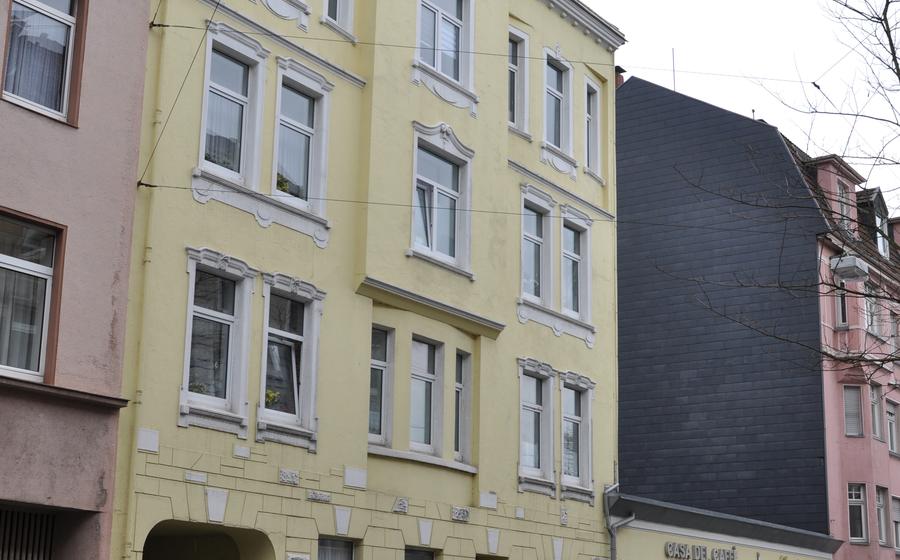
Wuppertal Dance Theatre (Tanztheater Wuppertal)
- Wuppertal Dance Theatre (Tanztheater Wuppertal)
- Pina Bausch - The Visionary Choreographer
- Repertoire and Performances
- Landmark Performances
- Artistic Collaborators and Ensemble
- International Recognition and Awards
- Educational Programs and Workshops
- Architecture and Design
- Location and Accessibility
- Tickets and Reservations
- Souvenirs and Merchandise
- Dining and Refreshments
- Accommodation and Nearby Attractions
- Dress Code and Etiquette
- Insider Tip
Wuppertal Dance Theatre (Tanztheater Wuppertal)
The Wuppertal Dance Theatre, known as Tanztheater Wuppertal, is a renowned contemporary dance company and venue located in the city of Wuppertal, Germany. Founded in 1973 by the visionary choreographer Pina Bausch, Tanztheater Wuppertal has become a global force in the world of dance, pushing boundaries and redefining the art form through its groundbreaking productions.
The theatre's architectural significance lies in its unique design by Gerhard Graubner, featuring a striking combination of concrete, glass, and steel. The building's distinctive facade and interior spaces create a dynamic and immersive environment for dance performances, enhancing the audience's experience.
Tanztheater Wuppertal's importance in the world of dance stems from its pioneering approach, which fuses elements of modern dance, theater, and performance art. Under the leadership of Pina Bausch, the company challenged conventional notions of dance, exploring themes of human relationships, identity, and social issues through powerful and evocative movement.
Pina Bausch's legacy and impact on contemporary dance are immeasurable. Her innovative choreographic style, characterized by intense physicality, emotional depth, and a unique blend of movement and storytelling, revolutionized the field. Bausch's work has inspired generations of dancers and choreographers worldwide, leaving an enduring mark on the art form.
Pina Bausch - The Visionary Choreographer
Pina Bausch, born in 1940 in Solingen, Germany, was a visionary choreographer and dancer who revolutionized the world of contemporary dance. Her early training in ballet and modern dance provided a solid foundation for her unique choreographic style, which transcended traditional boundaries and explored the depths of human emotions and relationships.
Bausch's approach to choreography was highly collaborative, involving her dancers as co-creators in the development of her works. She believed in the power of movement, gesture, and physicality to express the innermost thoughts and feelings of her characters, creating a raw and authentic connection with the audience.
Throughout her career, Pina Bausch collaborated with renowned international artists from various disciplines, including musicians, composers, and visual artists. These collaborations enriched her work, adding layers of complexity and depth to her choreographies.
Bausch's work was not without controversy. Her bold and provocative style, often delving into taboo subjects and challenging societal norms, drew both critical acclaim and criticism. However, her unwavering commitment to artistic freedom and her ability to push boundaries made her one of the most influential choreographers of the 20th century.
Repertoire and Performances
The Tanztheater Wuppertal boasts a diverse and captivating repertoire that showcases Pina Bausch's unique choreographic style and her collaborations with talented artists from various disciplines. One of the theatre's signature pieces is "Café Müller," a groundbreaking work that premiered in 1978 and continues to mesmerize audiences with its dreamlike atmosphere and exploration of human relationships. Another must-see performance is "The Rite of Spring," Bausch's reinterpretation of Stravinsky's ballet, which combines primal energy with contemporary movement vocabulary.
The theatre's repertoire also includes thought-provoking works such as "Kontakthof," which delves into the complexities of human interactions, and "Vollmond," a poignant exploration of love, loss, and the passage of time. Bausch's fusion of dance, music, and visual art is evident in pieces like "Nelken," which incorporates live music and striking visuals, and "Masurca Fogo," a vibrant celebration of Brazilian culture.
The Tanztheater Wuppertal's international tours have garnered critical acclaim and introduced Bausch's work to audiences worldwide. The theatre has collaborated with renowned artists such as the cellist Yo-Yo Ma and the musician Brian Eno, creating innovative and cross-disciplinary performances.
Special events and festivals hosted by the theatre offer a platform for emerging choreographers and provide opportunities for audiences to engage with the creative process. The annual Pina Bausch Festival, held in Wuppertal, celebrates the legacy of the visionary choreographer and showcases the theatre's latest productions.
Landmark Performances
The Tanztheater Wuppertal has a rich history of groundbreaking and iconic works that have shaped its reputation as a leading force in contemporary dance. Among these landmark performances, a few stand out as particularly significant:
-
"Café Müller" (1978): This seminal work, set in a dilapidated café, explores themes of isolation, loss, and longing through a series of haunting and enigmatic tableaus.
-
"The Rite of Spring" (1975): Pina Bausch's reimagining of Stravinsky's ballet is a raw and visceral exploration of primal instincts and rituals, featuring a powerful and unforgettable sacrificial scene.
-
"Kontakthof" (1978): This piece delves into the complexities of human relationships, examining the dynamics of power, intimacy, and rejection through a series of encounters between men and women.
-
"Vollmond" (1985): Set to the music of Béla Bartók, "Vollmond" explores the cyclical nature of life and death, using dreamlike imagery and surreal landscapes to create a haunting and evocative atmosphere.
-
"Nelken" (1982): This collaboration with the Japanese dancer and choreographer Kazuo Ohno is a fusion of dance, music, and visual art, exploring themes of cultural identity and the interconnectedness of all things.
-
"Masurca Fogo" (1998): Set to the music of Astor Piazzolla, "Masurca Fogo" is a vibrant and passionate celebration of life, featuring a mix of traditional and contemporary dance styles.
Artistic Collaborators and Ensemble
Pina Bausch's creative vision was brought to life by a talented ensemble of dancers, choreographers, and artistic collaborators. Among the key figures in her team was Rolf Borzik, her long-time dramaturge and artistic advisor. Together, they shaped the unique aesthetic and narrative style of the Tanztheater Wuppertal.
Notable dancers and choreographers who left their mark on the company include Dominique Mercy, Lutz Förster, Jan Minarik, and Malou Airaudo. Their diverse backgrounds and artistic perspectives contributed to the richness and variety of the theatre's repertoire.
International guest artists, such as Mikhail Baryshnikov, William Forsythe, and Meg Stuart, have also collaborated with the Tanztheater Wuppertal, bringing fresh ideas and influences to the company. These collaborations fostered a spirit of artistic exchange and innovation.
Pina Bausch's ensemble was not just a group of performers but a close-knit community of artists dedicated to her unique vision. Their shared passion and commitment created a fertile ground for artistic exploration and experimentation. The legacy of this ensemble continues to inspire and influence contemporary dance worldwide.
International Recognition and Awards
The Tanztheater Wuppertal has garnered international acclaim and recognition for its groundbreaking work and artistic excellence. The theatre has been honored with numerous prestigious awards, including the Laurence Olivier Award for Outstanding Achievement in Dance, the Golden Lion for Lifetime Achievement at the Venice Biennale, and the Kyoto Prize for Lifetime Achievement in the Arts and Philosophy.
Pina Bausch, the visionary choreographer behind the Tanztheater Wuppertal, was celebrated for her revolutionary approach to dance and her profound impact on contemporary dance. She received countless accolades, including the German Dance Prize, the French Legion of Honor, and the Goethe Medal. Her work transcended national boundaries, captivating audiences worldwide and leaving an indelible mark on the world of dance.
The Tanztheater Wuppertal's global influence is reflected in its extensive touring schedule. The company has performed in renowned venues across the globe, captivating audiences with its innovative productions. Their international tours have not only showcased the theatre's artistic prowess but have also fostered cultural exchange and collaboration, leaving a lasting legacy in the global dance community.
Educational Programs and Workshops
The Tanztheater Wuppertal is dedicated to nurturing the next generation of dancers and choreographers through its extensive educational programs and workshops. Aspiring artists from around the world are drawn to these opportunities to learn from the theatre's renowned faculty and immerse themselves in the unique style and philosophy of Pina Bausch.
The theatre offers a range of workshops and masterclasses throughout the year, covering various aspects of dance, from contemporary techniques to improvisation and composition. These intensive sessions provide participants with invaluable insights into the creative process and the artistic vision of the Tanztheater Wuppertal.
Summer schools and international exchange programs offer further opportunities for dancers to hone their skills and broaden their perspectives. These immersive programs bring together artists from diverse backgrounds, fostering a vibrant exchange of ideas and experiences.
Beyond its focus on professional development, the Tanztheater Wuppertal also engages with the broader community through educational initiatives. Outreach programs, school partnerships, and workshops for children and young people introduce the magic of dance to new audiences and inspire the next generation of dance enthusiasts.
Architecture and Design
The Tanztheater Wuppertal is housed in a striking building designed by renowned artist Gerhard Graubner. The theatre's unique architectural features reflect Graubner's vision of integrating art and architecture into a cohesive space. The building's exterior facade is distinguished by its bold geometric shapes and vibrant colors, creating a visually captivating landmark in the city center.
Inside, the theatre offers a range of functional spaces that cater to the needs of rehearsals, workshops, and performances. The main auditorium is a flexible space that can be adapted to accommodate various stage configurations and seating arrangements, allowing for a diverse range of productions. The theatre also features a number of smaller studios and rehearsal rooms, providing opportunities for experimentation and creative exploration.
Graubner's design for the Tanztheater Wuppertal extends beyond aesthetics, incorporating practical considerations to enhance the functionality of the building. The theatre's interior spaces are designed to optimize acoustics and lighting, ensuring that every performance is experienced with the highest quality of sound and visual clarity.
The Tanztheater Wuppertal's architectural and design elements contribute to its status as a unique and inspiring venue for contemporary dance. The building's distinctive features not only provide a visually striking backdrop but also create an immersive environment that enhances the artistic experience for performers and audiences alike.
Location and Accessibility
The Wuppertal Dance Theatre is conveniently located in the heart of Wuppertal, a vibrant city in western Germany. Its central location makes it easily accessible by various means of transportation. For those arriving by public transport, the theatre is just a short walk from the Wuppertal Hauptbahnhof (main railway station). Several bus and tram lines also stop nearby, providing convenient connections from different parts of the city.
For those who prefer to drive, the theatre offers ample parking facilities. A multi-story car park is located directly adjacent to the theatre, ensuring easy and secure parking for visitors. The theatre is also accessible for differently-abled individuals, with wheelchair ramps and elevators providing barrier-free access to all areas of the building.
Tickets and Reservations
To ensure a memorable and hassle-free experience, advance booking for tickets is highly recommended, especially for popular performances and events. The Tanztheater Wuppertal offers various ticketing options to cater to diverse preferences and budgets.
Online reservations through the theatre's website provide convenience and real-time availability checks. Patrons can choose their preferred seats, view seating plans, and securely purchase tickets using various payment methods.
Ticket prices vary depending on the performance, seat category, and any applicable discounts. Standard tickets typically range from 15 to 45 euros, while concessions for students and seniors offer reduced rates.
The theatre also offers group discounts and special packages for larger groups, providing a cost-effective way to enjoy the performances with friends or colleagues. These packages often include additional benefits such as guided tours or exclusive insights into the theatre's productions.
Last-minute ticket availability may be limited, so it's advisable to book in advance to secure the desired seats and avoid disappointment. The theatre's box office is open during regular hours for in-person purchases and inquiries.
Souvenirs and Merchandise
The Wuppertal Dance Theatre offers a unique opportunity to take home a piece of its rich history and legacy through its on-site gift shop. This vibrant space is a treasure trove of memorabilia and souvenirs that celebrate the theatre's iconic productions and the visionary work of Pina Bausch.
Among the must-have items are books that delve into the creative process behind groundbreaking performances, capturing the essence of Pina Bausch's choreography and the stories that unfold on stage. For those seeking a visual reminder of the theatre's magic, DVDs of iconic performances offer a chance to relive the electrifying energy and artistry that have made the Tanztheater Wuppertal a global phenomenon.
Limited-edition merchandise, often designed in collaboration with renowned artists, provides a unique way to show your support for the theatre and own a piece of its creative spirit. These exclusive items range from stylish clothing and accessories to home décor and collectibles, each infused with the essence of the Tanztheater Wuppertal's artistic journey.
Whether you're a longtime fan or a first-time visitor, the gift shop at the Wuppertal Dance Theatre offers a tangible connection to the world of Pina Bausch and her groundbreaking choreography. Take home a souvenir to cherish, a reminder of the transformative power of dance and the enduring legacy of the Tanztheater Wuppertal.
Dining and Refreshments
Indulge in Culinary Delights at the Tanztheater Wuppertal
Enhance your visit to the Tanztheater Wuppertal with a delectable culinary experience. Whether you prefer a pre-show drink or a post-performance meal, the theatre offers a range of dining options to satisfy your cravings.
Within the theatre premises, you'll find a charming café or restaurant that serves a variety of refreshments and snacks. Enjoy a refreshing beverage or a light bite to eat while immersing yourself in the vibrant atmosphere of the theatre.
The menu features a selection of local culinary specialties and international cuisine, ensuring something to tempt every palate. From regional delicacies to international flavors, you can savor a delicious meal before or after your dance performance.
For special events and functions, the theatre also offers catering services. Whether you're hosting a private gathering or a corporate event, the Tanztheater Wuppertal's culinary team can create a customized menu to suit your needs.
Accommodation and Nearby Attractions
Budget-friendly options for accommodation include the Dorint Hotel Wuppertal and the Ibis Hotel Wuppertal City. For a more luxurious stay, consider the Steigenberger Hotel Wuppertal or the Hotel de Wuppertal.
Must-visit attractions in Wuppertal include the Von der Heydt Museum, which houses an impressive collection of art from the Middle Ages to the present day, and the Wuppertal Zoo, home to over 4,500 animals from all over the world.
For a unique shopping experience, head to the Elberfelder City-Galerie, a modern shopping mall with over 130 stores. For a taste of local cuisine, try the traditional Bergische Kaffeetafel, a coffee table spread with a variety of sweet and savory dishes.
Dress Code and Etiquette
Respectful behavior and proper etiquette are essential for enhancing the theatre experience. When attending a performance at the Tanztheater Wuppertal, it is customary to dress appropriately. While there is no strict dress code, smart casual attire is generally recommended. Avoid wearing overly casual clothing such as shorts, flip-flops, or sportswear.
Remember to turn off your mobile phones and electronic devices before the performance begins. This not only shows consideration for the artists and fellow audience members but also helps create a distraction-free environment. Applause and curtain calls are customary ways to express appreciation for the dancers and their work.
Following these simple guidelines will ensure that you have a pleasant and respectful experience at the Tanztheater Wuppertal.
Insider Tip
To make the most of your visit to the Wuppertal Dance Theatre, consider these insider tips:
-
Plan ahead and book your tickets early, especially for popular performances that tend to sell out quickly.
-
After the show, immerse yourself in Wuppertal's vibrant nightlife. The city offers a diverse range of bars, clubs, and live music venues to keep you entertained into the wee hours.
-
If you have the time, attend a workshop or masterclass offered by the theatre. These sessions provide an opportunity to learn from the Tanztheater Wuppertal's experienced dancers and choreographers, gaining a deeper understanding of their unique approach to dance.
-
Wuppertal is home to a wealth of cultural attractions beyond the Tanztheater. Take advantage of your visit to explore the city's museums, art galleries, historical landmarks, and shopping districts. Discover hidden gems and create a truly memorable experience.
Remember, the Wuppertal Dance Theatre is not just a venue for performances; it's a vibrant cultural hub that offers a range of experiences for dance enthusiasts and art lovers alike. Embrace the opportunity to immerse yourself in the world of Pina Bausch and her groundbreaking legacy. Let the magic of dance transport you to new realms of creativity and expression.
